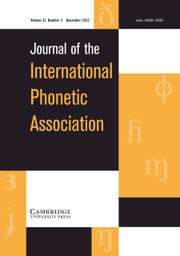Article contents
Is the phonetic quality of unaccented words unpredictable? An example from spontaneous Finnish
Published online by Cambridge University Press: 15 February 2002
Abstract
In spontaneous speech, occurrences of the same word form vary phonetically. Words that do not receive sentence accent tend to be less clearly articulated and shorter in duration in comparison to prominent words. If such an unaccented word is isolated from continuous speech, it may not even be identifiable by listeners, but as part of the speech stream, it is usually easily identified and helps the listener to perceive and organize the spoken message as a whole. Thus, the variability of unaccented words is not random but must follow certain patterns determined by context. In this study, we take a closer look at the Finnish unaccented word-like construction niinku in spontaneous conversational speech samples collected from one female Finnish speaker. We provide an analysis of the phonetic variability of the niinku structure found in the data, including such properties as segmental duration, segmental make-up, and phonetic quality. We then show what kind of properties are common to all occurrences of this unaccented construction and discuss the conditions that probably govern its acoustic-phonetic quality.
- Type
- Research Article
- Information
- Copyright
- © 2001 International Phonetic Association
- 6
- Cited by


